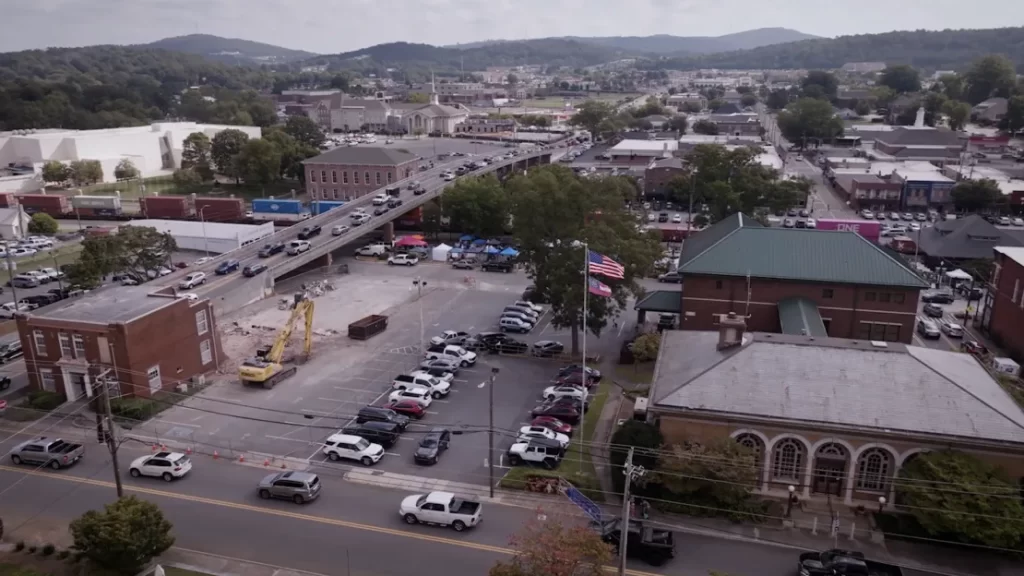Biden’s clean energy law revived this red corner of Georgia. Voters there are backing Trump anyway
4 min read
A view of Dalton, Georgia

A view of Dalton, Georgia
In the northwest corner of Georgia, off Interstate 75, the face of a new era in American manufacturing is taking shape. Here lies the Qcells plant, which produces an impressive 32,000 solar panels daily, boasting a total production capacity of 5.1 gigawatts—more than double the peak capacity of the Hoover Dam.
Lisa Nash, the plant manager, recalls a time when the site was merely dirt with no buildings. “When I came here, there was nothing,” she said. Today, she reflects on the rapid transformation and the significant growth of the local community in Dalton. “The population’s growing. They’re buying houses, shopping, and contributing to the local economy.”
This remarkable growth has been fueled by the Biden administration’s climate investment law enacted in 2022, which provided critical support for the green energy sector. Scott Moskowitz, head of market strategy and public affairs at Qcells, noted that the Inflation Reduction Act served as the catalyst for their investments. The importance of this legislation was underscored by Vice President Kamala Harris’s visit to the plant last year, where she engaged with employees and highlighted the company’s achievements.
For Kimberly Richardson, a Qcells employee tasked with managing the plant’s recycling operation, Harris’s campaign resonates deeply. As a Black woman, Richardson feels empowered by Harris’s achievements. “She represents every woman in the United States,” she said, emphasizing the role of representation in inspiring future generations.
However, the political climate in Georgia remains complex. Despite the plant’s success and the economic boost it has brought, support for former President Donald Trump remains strong in the region. Kasey Carpenter, the Republican state representative for Dalton, pointed out that while Harris’s visit aimed to celebrate progress, it wasn’t met with enthusiasm in north Georgia.
Dalton, located in the congressional district represented by GOP firebrand Marjorie Taylor Greene, is firmly in Trump territory. Carpenter explained that the independence and outsider appeal Trump offers resonate with local voters. Yet, he admits the political landscape is frustrating, often feeling like citizens are limited to just two candidates when many options exist.
At the heart of the local political debate is inflation. Carpenter indicated that economic concerns outweigh political affiliations for many in the community, which has faced significant challenges in recent years. Once known as the carpet capital of the world, Dalton struggled through the housing market crash of 2008, prompting local leaders to diversify the economy and attract new industries.
The efforts to revitalize Dalton align with both state and federal initiatives. Republican Governor Brian Kemp has worked to create incentives for companies to invest in Georgia, while the Biden administration’s climate policies have further propelled this momentum. Nash emphasizes the importance of collaboration across all levels of government in making the Qcells project a reality. “Without one ingredient, you can’t successfully have this project,” she said.
The resurgence of manufacturing jobs has attracted a diverse workforce, from seasoned professionals to high school students. Nash noted that the plant employs workers from different generations, highlighting a thriving community atmosphere.
Just 50 miles down the road in Cartersville, local initiatives continue to foster community spirit. Mayor Matt Santini described the town as having a “hometown feel,” despite its strong Republican support. The local farmer’s market, which has been recognized as the best in Georgia, reflects this community engagement.
Back in Dalton, Carpenter remains closely connected to the community through his restaurant, where he interacts with residents and fosters local pride. He acknowledges the irony in the area’s support for the green energy sector despite broader political sentiments. “We’re growing the green energy that they don’t necessarily care that much about,” he remarked. Yet, he believes awareness of the economic benefits is slowly changing minds.
The Qcells plant has also sparked tangible developments, such as the opening of a new boutique hotel in downtown Dalton, the first in 50 years. Despite Trump’s campaign threats to repeal the climate law driving this growth, local sentiments remain steadfast. “They don’t realize that if the whole thing is repealed, it will affect those 2,500 jobs,” Carpenter warned.
As Nash reflects on the future of the green energy industry, she remains optimistic. “We’re just scratching the surface,” she said, noting a transformative journey that her parents once deemed improbable. “I look at my kids and grandkids, and I’m thinking: ‘I wouldn’t mind them doing that.’”
Dalton’s transformation from a one-industry town to a burgeoning center of green energy innovation illustrates a compelling intersection of economic revival and political complexity. As the community continues to grow, the potential for change remains bright, even in uncertain political waters.